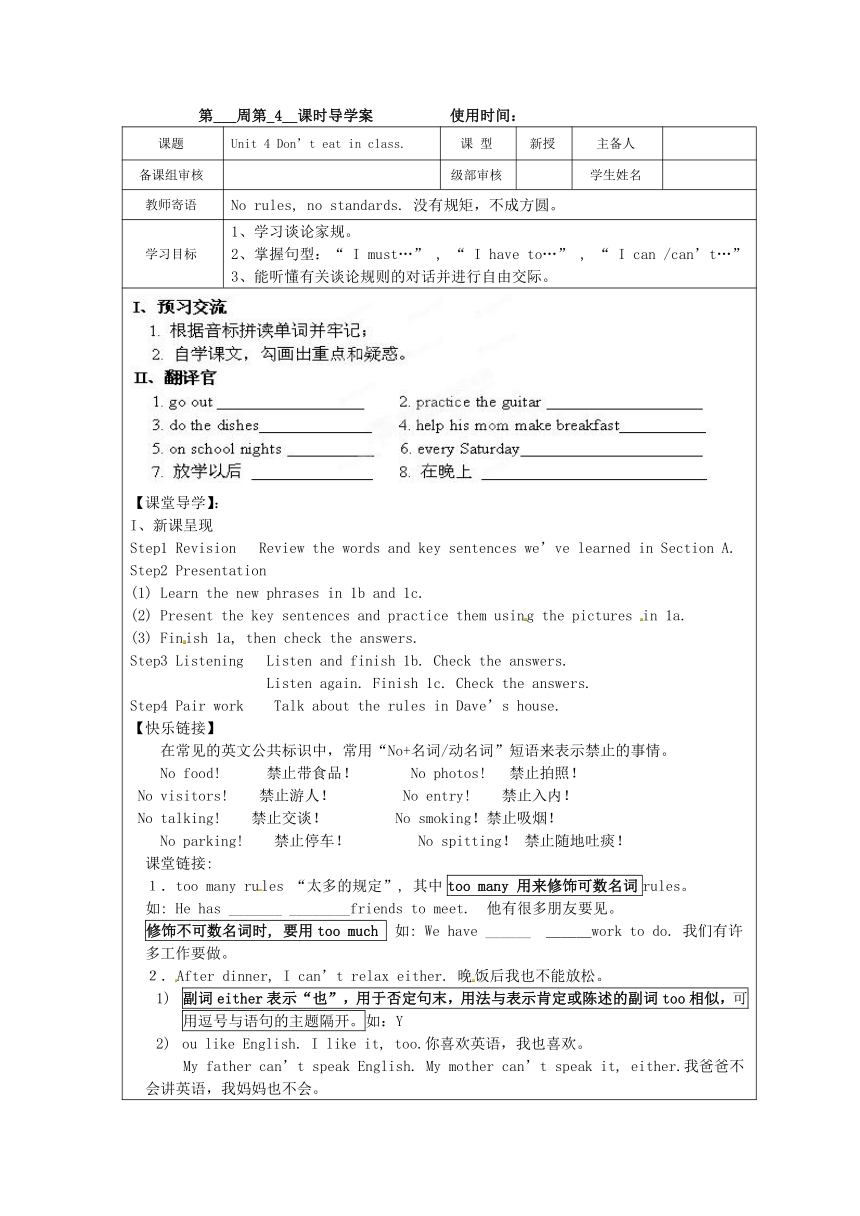Unit 4 Don't eat in class. Section B 2a-2c导学稿 (无答案)
文档属性
| 名称 | Unit 4 Don't eat in class. Section B 2a-2c导学稿 (无答案) |

|
|
| 格式 | doc | ||
| 文件大小 | 93.0KB | ||
| 资源类型 | 教案 | ||
| 版本资源 | 人教新目标(Go for it)版 | ||
| 科目 | 英语 | ||
| 更新时间 | 2022-12-17 00:00:00 | ||
图片预览

文档简介
第___周第_4__课时导学案 使用时间:
课题 Unit 4 Don’t eat in class. 课 型 新授 主备人
备课组审核 级部审核 学生姓名
教师寄语 No rules, no standards. 没有规矩,不成方圆。
学习目标 1、学习谈论家规。2、掌握句型:“ I must…” , “ I have to…” , “ I can /can’t…”3、能听懂有关谈论规则的对话并进行自由交际。
【课堂导学】:I、新课呈现Step1 Revision Review the words and key sentences we’ve learned in Section A.Step2 Presentation(1) Learn the new phrases in 1b and 1c.(2) Present the key sentences and practice them using the pictures in 1a.(3) Finish 1a, then check the answers.Step3 Listening Listen and finish 1b. Check the answers.Listen again. Finish 1c. Check the answers. Step4 Pair work Talk about the rules in Dave’s house. 【快乐链接】 在常见的英文公共标识中,常用“No+名词/动名词”短语来表示禁止的事情。 No food! 禁止带食品! No photos! 禁止拍照! No visitors! 禁止游人! No entry! 禁止入内! No talking! 禁止交谈! No smoking!禁止吸烟!No parking! 禁止停车! No spitting! 禁止随地吐痰!课堂链接:1.too many rules “太多的规定”, 其中too many 用来修饰可数名词rules。如: He has _______ ________friends to meet. 他有很多朋友要见。修饰不可数名词时, 要用too much 如: We have ______ ___work to do. 我们有许多工作要做。2.After dinner, I can’t relax either. 晚饭后我也不能放松。副词either表示“也”,用于否定句末,用法与表示肯定或陈述的副词too相似,可用逗号与语句的主题隔开。如:You like English. I like it, too.你喜欢英语,我也喜欢。 My father can’t speak English. My mother can’t speak it, either.我爸爸不会讲英语,我妈妈也不会。精挑细选用括号中所给词语的适当形式填空。 1. My sister wants_________(use ) the computer. 2. We have to________(exercise) every day. 3. The music ________ (sound) very nice. 4.Tomorrow is Sunday. Let’s _________(play) soccer. 6.My teacher helps us__________(speak) English. 7.Music is__________(relax) and beautiful. 8.Look, the girl’s___________(tooth) are so white. 9.It takes______(he) 30 minutes________(clean) his room. 10.It’s________(relax) for_______(we)___________(play) sports. 11.We practice________(speak) English every day. 14.The beautiful house is my______________(sister.) 13. She __________(do) the __________(dish) every day. 15. He often ____________(feel) boring, because he often _____________(relax) six hours a day. 16. He has to ________(help) his mother___________(do) the housework. II. “译”展身手Linda is an American girl. She is a good student. Every morning she gets up at 6:00. She has breakfast at home. ( 1 ) Then she wears her uniform and goes to school. She studies hard every day. ( 2 )她在餐厅吃中饭when she is at school. After school, ( 3 )she does her homework first, and then she cleans the room and ( 4 )帮助她妈妈做晚饭. Before she goes to bed, she usually reads some books. Then at 10:00p.m. she goes to bed. ( 5 )She thinks she is happy every day. What do you think ( 1 ) ( 2 ) ( 3 ) ( 4 ) ( 5 )
自我评价专栏(分优良中差四个等级)
自主学习: 合作与交流: 书写: 综合:
课题 Unit 4 Don’t eat in class. 课 型 新授 主备人
备课组审核 级部审核 学生姓名
教师寄语 No rules, no standards. 没有规矩,不成方圆。
学习目标 1、学习谈论家规。2、掌握句型:“ I must…” , “ I have to…” , “ I can /can’t…”3、能听懂有关谈论规则的对话并进行自由交际。
【课堂导学】:I、新课呈现Step1 Revision Review the words and key sentences we’ve learned in Section A.Step2 Presentation(1) Learn the new phrases in 1b and 1c.(2) Present the key sentences and practice them using the pictures in 1a.(3) Finish 1a, then check the answers.Step3 Listening Listen and finish 1b. Check the answers.Listen again. Finish 1c. Check the answers. Step4 Pair work Talk about the rules in Dave’s house. 【快乐链接】 在常见的英文公共标识中,常用“No+名词/动名词”短语来表示禁止的事情。 No food! 禁止带食品! No photos! 禁止拍照! No visitors! 禁止游人! No entry! 禁止入内! No talking! 禁止交谈! No smoking!禁止吸烟!No parking! 禁止停车! No spitting! 禁止随地吐痰!课堂链接:1.too many rules “太多的规定”, 其中too many 用来修饰可数名词rules。如: He has _______ ________friends to meet. 他有很多朋友要见。修饰不可数名词时, 要用too much 如: We have ______ ___work to do. 我们有许多工作要做。2.After dinner, I can’t relax either. 晚饭后我也不能放松。副词either表示“也”,用于否定句末,用法与表示肯定或陈述的副词too相似,可用逗号与语句的主题隔开。如:You like English. I like it, too.你喜欢英语,我也喜欢。 My father can’t speak English. My mother can’t speak it, either.我爸爸不会讲英语,我妈妈也不会。精挑细选用括号中所给词语的适当形式填空。 1. My sister wants_________(use ) the computer. 2. We have to________(exercise) every day. 3. The music ________ (sound) very nice. 4.Tomorrow is Sunday. Let’s _________(play) soccer. 6.My teacher helps us__________(speak) English. 7.Music is__________(relax) and beautiful. 8.Look, the girl’s___________(tooth) are so white. 9.It takes______(he) 30 minutes________(clean) his room. 10.It’s________(relax) for_______(we)___________(play) sports. 11.We practice________(speak) English every day. 14.The beautiful house is my______________(sister.) 13. She __________(do) the __________(dish) every day. 15. He often ____________(feel) boring, because he often _____________(relax) six hours a day. 16. He has to ________(help) his mother___________(do) the housework. II. “译”展身手Linda is an American girl. She is a good student. Every morning she gets up at 6:00. She has breakfast at home. ( 1 ) Then she wears her uniform and goes to school. She studies hard every day. ( 2 )她在餐厅吃中饭when she is at school. After school, ( 3 )she does her homework first, and then she cleans the room and ( 4 )帮助她妈妈做晚饭. Before she goes to bed, she usually reads some books. Then at 10:00p.m. she goes to bed. ( 5 )She thinks she is happy every day. What do you think ( 1 ) ( 2 ) ( 3 ) ( 4 ) ( 5 )
自我评价专栏(分优良中差四个等级)
自主学习: 合作与交流: 书写: 综合:
同课章节目录
- Unit 1 Can you play the guitar?
- Section A
- Section B
- Unit 2 What time do you go to school?
- Section A
- Section B
- Unit 3 How do you get to school?
- Section A
- Section B
- Unit 4 Don't eat in class.
- Section A
- Section B
- Unit 5 Why do you like pandas?
- Section A
- Section B
- Unit 6 I'm watching TV.
- Section A
- Section B
- Review of Units 1-6
- Unit 7 It's raining!
- Section A
- Section B
- Unit 8 Is there a post office near here?
- Section A
- Section B
- Unit 9 What does he look like?
- Section A
- Section B
- Unit 10 I'd like some noodles.
- Section A
- Section B
- Unit 11 How was your school trip?
- Section A
- Section B
- Unit 12 What did you do last weekend?
- Section A
- Section B
